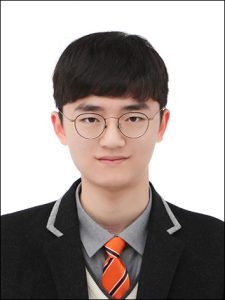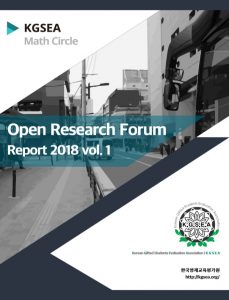The 2020 Open Research Forum will take place on an Online Webinar due to difficulties caused by COVID-19.
Presentations this year will be limited to undergraduate or graduate students.
Student-Friendly
There are no fees to pay and there certainly are no expectations for groundbreaking research.
Any passionate student’s research is welcomed as long as it fits our scope.
Non-Competitive
We will invite all students who have submitted to the Open Research Forum to scheduled forums.
In the forums, you can have a great time learning and discussing other researches with your peers, as well as receiving feedback.
Great Experience
Although The Open Research Forum is not an academic journal, the process of writing up a research paper stands the same here.
Going through the whole process of writing a research paper is a great experience, and we guarantee that it would help you in your future academic career.
*If you are taking a first step towards your own research, don’t hesitate. We have our guidelines set-up to be beginner-friendly.*
Schedule
July 25/26, 2020 (9 AM to 1 PM) UTC+9
Presentation order at the Open Research Forum Webinar may be subject to change.
The webinar session will open at 8:50AM KST for pre-registered audience members ONLY.
The Lecturers
Although the Open Research Forum is open to all, presenters must be invited and approved in advance in order to ensure authenticity and preparedness.
Due to the special circumstances this year, lectures will be reserved for a undergraduate or graduate students, all of whom have previously served the Forum as staff or teaching assistants. The full list of lecturers is below and is currently NO LONGER subject to change.
In order to be eligible for consideration, current and future lecturers must also submit a formal application through this form. They must also sign and abide by our Honor Code; failure to do so may and will result in removal from the Forum at any time.
| Speaker's Name | Major | School | Lecture Title |
|---|---|---|---|
| Jae Hee LEE | Mathematics | MIT (Graduate) | Symmetries |
| Ran WANG | Mathematics & Perspective Economics | Yale University | Design of Train Track System -- the Minimum Spanning Tree Problem |
| Hyunji KIM | Electrical Engineering & Computer Science | MIT | Basics of Programming |
| Gheehyun NAHM | Mathematics | University of Cambridge | Interesting Mathematics |
| Junghwan(John) LEE | Computer Science and Physics | UC Berkeley | Artificial Intelligence for games |
| Min Jae KIM | Chemical Physics (intended) | Columbia University | Categorical Propositions |
| Soohyuk CHO | Computer Science & Astrophysics (Intended) | UC Berkeley | Intro to Gravitational-Wave Astronomy |
| Yun Su HAN | Computer Science | Bugil Academy | Basics of Computer Vision Using OpenCV |
Lecture Note July 25
Speaker Title Subject Difficulties Yun Su HAN Basics of Computer Vision Using OpenCV Computer Science Anyone Min Jae KIM Categorical Propositions Propositional Logic Anyone Junghwan(John) LEE Artificial Intelligence for games
Computer Science, Mathematics 10~12th Grade Gheehyun NAHM Interesting Mathematics Mathematics Anyone

Yun Su HAN says
“I will introduce some basic concepts of computer vision, such as motion detection and creating contours, and create some simple demo programs of the concepts using OpenCV and Python.” Link 1 / Link 2

Min Jae KIM says
“I will be explaining different types categorical propositions and their relation to one another through the square of opposition. Then, I will describe the structure of Aristotelian syllogisms and how they can be visualized using Venn diagrams. (I will focusing most on first figure syllogism.)”

Junghwan (John) LEE says
“Everyone talks about how AIs (Artificial Intelligence) will shape our future. But how many people actually know how AIs actually work? By introducing the concept of AlphaBeta Pruning and Heuristics, I will create and simulate a basic AI for a simple board game.”

Gheehyun NAHM says
“I will give some examples of mathematical statements and proofs that I find interesting — I find a mathematical statement or proof interesting if it teaches me a new intuition and/or corrects an intuition I had. Such mathematics usually fall into one of two categories: it looks easy but it’s not as easy as you thought or might even be false, or it looks hard, impossible, or even false, but it might be true and might even have a surprisingly short proof!” The problems I introduce in my introduction video might (or might not) help.
Lecture Note July 26
| Speaker | Title | Subject | Difficulties |
|---|---|---|---|
| Hyunji KIM | Basics of Programming | Computer Science | 6~8th Grade |
| Ran Wang | Design of Train Track System -- the Minimum Spanning Tree Problem | Mathematics (Computer Science) | 10~12th Grade |
| Soohyuk CHO | Intro to Gravitational-Wave Astronomy | Physics / History of Science | ETC |
| Jaehee LEE | Symmetries | Mathematics | 10~12th Grade |

Hyunji KIM says
I’ll introduce the basics of programming using Turtle graphics in Python and demonstrate the different applications of programming.

Ran WANG says
The lecture is based on a problem on building railroads to connect cities: Given a list of cities with pairwise distances known. Design a system of train tracks such that (1) any two cities are connected to each other and (2) the total distance reaches the minimum. The mathematical formation of the problem is to find the minimum spanning tree of a (complete) graph. General concepts of trees and graphs would be introduced in the lecture. Two algorithms (Prim’s Algorithm and Kruskal’s Algorithm) would be introduced in the lecture. If time is to be sufficient, I would cover proof of correctness of at least one algorithm. The lecture would end with a note of real-life application in laying of communications cable. The problem itself is of graph theory, while the algorithms used to solve the problem are “Greedy Methods” in computer programming (codes would not be covered in the lecture). The video explains the concepts in a clear way.

SooHyuk CHO says
Since LIGO’s success in detecting gravitational waves in 2016, Gravitation-wave Astronomy has become one of the hottest fields in astronomical community. I will talk about the fundamental nature of GW, and the history of GW research and detection technology development. I will also talk about why the discovery of gravitational waves, along with the discovery of Higgs boson, is considered to be the greatest achievement in physics in the 21st century to date.
Mainly what I’m going to talk about is the history of research, so I expect the audiences don’t really need advanced physics background. However, there may be some physical descriptions related to quantum mechanics and the theory of relativity in explaining the physics of gravitational waves.

Jae hee LEE says
I will introduce the idea of symmetries (groups) and briefly sketch how the understanding of groups led to important milestones in mathematics and physics, showing applications in algebra (insolvability of the quintic) and particle physics (gauge theory).
Join as Audience
Please fill out the form below to register as an audience member for the 2020 Open Research Forum Webinar. Once the form has been filled out, an email will be sent to you containing the Webinar link and additional information about the event.
The form will be closed on July 22, 11:59 PM UCT+9. There is also a maximum audience limit of 90 members. Spots are allocated on a first-come-first-serve basis, so please be aware that the form may close before the final deadline.
Join as Lecturer
- Please contact us.
- Get a copy of your research ready. The research must be related to the fields of mathematics or science.
- The manuscript must be written in English.
- Read the Honor Code and make sure you follow it.
- Then, format your paper with the given template. The template can be found on the website.
- Submit your paper before the deadline using the submission form, and wait for our reply!
Resource
Please feel free to refer to past presentations and publications created by members of the KGSEA Math Circle. These Open School files are completely available to all and may be used for non-commercial purposes; we hope that they will be helpful to you in your own academic explorations.
Documents
- September 2019 – Introduction to Functions: Dong Kyun LIM (PDF)
- September 2019 – KNN & K-Means Algorithm: Yunsu HAN (PDF)
- October 2019 – Predicate Logic: Minjae KIM (PDF)
- November 2019 – Summations in Probability: Yongjun (Mark) LEE (PDF)
- December 2019 – Mendelian Genetics: Joshua Nam (PDF)
- January 2020 – Vieta’s Formulas: Daniel Yejoon KANG (PDF)
- February 2020 – Introduction to Manim: Joon KIM (PDF)
- March 2020 – BFS & DFS – Path Finding Algorithms: Raymond KIM (PDF)
- April 2020 – Logistics Regression in Proteins: Charles (Alan) SHIN (PDF)
- May 2020 – Calculating Molarity: Han Na SHIN (PDF)
- June 2020 – Cinematography: Justin CHOI (PDF)
- July 2020 – Introduction to Mathematical Models: Seonghyun (Sean) Yoon (PDF)
- August 2020 – Seungjae YANG
Videos
- Introduction to Functions: Dong Kyun LIM
- KNN & K-Means Algorithm: Yunsu HAN
- Predicate Logic: Minjae KIM
- Summations in Probability: Yongjun LEE (VIDEO)
- Mendelian Genetics: Joshua NAM
- Vieta’s Formulas: Daniel KANG
- Manim in Computer Graphing: Joon KIM
- BFS & DFS – Path Finding Algorithms: Raymond KIM (VIDEO)
- Math in Pharmacokinetics: Charles SHIN
- Calculating Molarity: Han Na SHIN (VIDEO)
- The Basic of Cinematography: Justin CHOI (VIDEO)
- Introduction to Mathematical Model: SeongHyun (sean) YOON
FAQ
Is the Open Research Forum an online event?
The Forum is traditionally held offline; due to the special circumstances at hand, we will be moving temporarily to an online Webinar for the 2020 event.
How should we prepare for the Webinar?
All attendees and lecturers must have Zoom installed and connected to working video and audio in order to enable effective interaction and dialogue.
How can we participate?
The 2020 Open Research Forum Webinar will be conducted using Zoom. Participants will receive an email with a click-to-join webinar link following successful registration.
How do we apply as presenters for future Open Research Forum events?
Please feel free to explore any ideas you may have! Prospective lecture topics and/or presentations can be sent to [insert email address]; provided the deadline has not elapsed, we will be able to reach out to you individually.
Where are Open Research Forum events held?
The Open Research Forum is currently based in South Korea; we are 100% open to holding events in other countries. Please feel free to contact [insert email address] if you are interested in doing so!
What is the Honor Code?
The Open Research Forum Honor Code contains basic stipulations regarding plagiarism and other violations of fundamental academic integrity.
Is there a format for Forum submissions?
All prospective lecturers must submit their content as Microsoft Word documents for ease of synthesis and publication. Please download and use our official template.
Are there participation fees for the Open Research Forum?
The Open Research Forum is free for all participants and lecturers; however, for events which require an official venue, a small participation fee may be added.
Can the contents of the Open Research Forum be shared?
All Open Research Forum files and videos are available for free download on the website and can be shared for non-commercial purposes.
Are all Open Research Forum lectures in English?
Yes; English is the official language of the Open Research Forum and all lectures and other activities will be conducted in English.
Honor Code
Copyright on researches and following findings are held by the author(s). For research done by multiple authors, the first author agrees to the terms of agreement below on behalf of all authors. For research done by an individual, the sole author agrees to the terms of agreement below.
i. The author(s) warrant that the personal information they have entered (name, institutional affiliation, age) are correct. If an error is found at a later date, the authors must contact the editorial board to notify the mistake.
ii. The author(s) are aware that they are fully responsible for the consequences of unethical behavior, such as plagiarism, data manipulation and failure to properly acknowledge assistances. If an author is deemed guilty of these unethical practices, their research will be withdrawn and their institution will be contacted.
iii. The author(s) are fully responsible for the quality of their research, namely the correctness of any mathematical or scientific concepts in the manuscript.
Contact us
